Go Lean Commentary
75 years ago today – January 27, 1945 – was the Big Reveal …
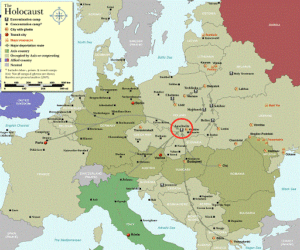 There were rumors, accusations and suspicions of cruel atrocities against victims behind the German lines during World War II. Nevertheless, there was also a degree of doubt as well. Nazi Germany had deniability … until this day 75 years ago. This is when Soviet troops liberated the Concentration Camp in Auschwitz, Poland:
There were rumors, accusations and suspicions of cruel atrocities against victims behind the German lines during World War II. Nevertheless, there was also a degree of doubt as well. Nazi Germany had deniability … until this day 75 years ago. This is when Soviet troops liberated the Concentration Camp in Auschwitz, Poland:
“The cat was out the bag”.
See a summary and highlights of Auschwitz here:
Title: Auschwitz Concentration Camp
The camp was a complex of over 40 concentration and extermination camps operated by Nazi Germany in occupied Poland during World War II and the Holocaust. It consisted of Auschwitz I, the main camp (Stammlager) in Oświęcim; Auschwitz II–Birkenau, a concentration and extermination camp built with several gas chambers; Auschwitz III–Monowitz, a labor camp created to staff a factory for the chemical conglomerate IG Farben; and dozens of subcamps.[3] The camps became a major site of the Nazis’ Final Solution to the Jewish Question.After Germany invaded Poland in September 1939, sparking World War II, the Schutzstaffel (SS) converted Auschwitz I, an army barracks, into a prisoner-of-war camp for Polish political prisoners.[4] The first inmates, German criminals brought to the camp in May 1940 as functionaries, established the camp’s reputation for sadism. Prisoners were beaten, tortured, and executed for the most trivial reasons. The first gassings—of Soviet and Polish prisoners—took place in block 11 of Auschwitz I around August 1941. Construction of Auschwitz II began the following month, and from 1942 until late 1944 freight trains delivered Jews from all over German-occupied Europe to its gas chambers. Of the 1.3 million people sent to Auschwitz, 1.1 million died. The death toll includes 960,000 Jews (865,000 of whom were gassed on arrival), 74,000 non-Jewish Poles, 21,000 Roma, 15,000 Soviet prisoners of war, and up to 15,000 other Europeans.[5] Those not gassed died of starvation, exhaustion, disease, individual executions, or beatings. Others were killed during medical experiments.
At least 802 prisoners tried to escape, 144 successfully, and on 7 October 1944 two Sonderkommando units, consisting of prisoners who staffed the gas chambers, launched an unsuccessful uprising. Only 789 staff (no more than 15 percent) ever stood trial;[6] several, including camp commandant Rudolf Höss, were executed. The Allies‘ failure to act on early reports of atrocities in the camp by bombing it or its railways remains controversial.
As the Soviet Red Army approached Auschwitz in January 1945, toward the end of the war, the SS sent most of the camp’s population west on a death march to camps inside Germany and Austria. Soviet troops entered the camp on 27 January 1945, a day commemorated since 2005 as International Holocaust Remembrance Day. In the decades after the war, survivors such as Primo Levi, Viktor Frankl, and Elie Wiesel wrote memoirs of their experiences in Auschwitz, and the camp became a dominant symbol of the Holocaust. In 1947 Poland founded the Auschwitz-Birkenau State Museum on the site of Auschwitz I and II, and in 1979 it was named a World Heritage Site by UNESCO.
Table I – Auschwitz Death Estimates
Nationality/ethnicity
(Source: Franciszek Piper)[2]Registered deaths
(Auschwitz)Unregistered deaths
(Auschwitz)Total Jews 95,000 865,000 960,000 Ethnic Poles 64,000 10,000 74,000 (70,000–75,000) Roma and Sinti 19,000 2,000 21,000 Soviet prisoners of war 12,000 3,000 15,000 Other Europeans:
Soviet citizens (Byelorussians, Russians, Ukrainians),
Czechs, Yugoslavs, French, Germans, Austrians10,000–15,000 n/a 10,000–15,000 Total deaths in Auschwitz, 1940–1945 200,000–205,000 880,000 1,080,000–1,085,000 Source: Retrieved January 27, 2020 from: https://en.wikipedia.org/wiki/Auschwitz_concentration_camp

This was mankind’s lowest point, the “darkest chapter in human history” … or was it?
“Never Again” became the mantra from this point forward for Holocaust victims and other stakeholders. These ones wanted to present Auschwitz as a Cautionary Tale so that “the world” would Never Again tolerate “man mistreating man” so egregiously.
Never Again lasted “for a minute”!
But “Never Again” has only been empty words. Within the days, weeks, months and years of this atrocity, more atrocities emerged. This is not just my assertion; this is the fact … as chronicled by historians, anthropologists, academicians, journalists and newscasters alike; see the highlights of a sample book on the subject here:
The Great Big Book of Horrible Things: The Definitive Chronicle of History’s 100 Worst Atrocities – a popular history book by Matthew White, an independent scholar and self-described atrocitologist. The book provides a ranking of the hundred worst atrocities of mankind based on the number of deaths.
In the pages of his book, the author, Matthew White, details the 100 Worst Atrocities of Mankind from Antiquity to Modernity. Let’s pick up his ranking from World War II and present the detailed list since those atrocious events. See here-now:
Table II – White’s ranking of atrocities
Rank Event Place Start year End year Death toll 1 World War Two Europe, Asia, Africa 1939 1945 66,000,000 36 Expulsion of Germans from Eastern Europe Eastern Europe 1945 1947 2,100,000 88 French Indochina War French Indochina 1945 1954 393,000 70 Partition of India India and Pakistan 1947 1947 500,000 2 Mao Zedong‘s rule China 1949 1976 40,000,000 30 Korean War Korea 1950 1953 3,000,000 30 North Korea North Korea 1948 3,000,000 69 Algerian War of Independence Algeria 1954 1962 525,000 35 Sudanese Civil Wars Sudan, South Sudan 1955 2,600,000 24 Vietnam War Southeast Asia 1959 1975 4,200,000 81 Suharto’s purge Indonesia 1965 1966 400,000 46 Biafran War Nigeria 1966 1970 1,000,000 40 Bengali Genocide Bangladesh 1971 1971 1,500,000 96 Idi Amin‘s rule Uganda 1971 1979 300,000 37 Mengistu Haile‘s rule Ethiopia 1974 1991 2,000,000 91 Postwar Vietnam Vietnam 1975 1992 365,000 39 Democratic Kampuchea Cambodia 1975 1979 1,670,000 55 Mozambican Civil War Mozambique 1975 1992 800,000 70 Angolan Civil War Angola 1975 1994 500,000 70 Ugandan Bush War Uganda 1979 1986 500,000 40 Soviet–Afghan War Afghanistan 1979 1992 1,500,000 96 Saddam Hussein‘s peacetime rule Iraq 1979 2003 300,000 61 Iran–Iraq War Persian Gulf 1980 1988 700,000 94 Sanctions against Iraq Iraq 1990 2003 350,000 70 Anarchy in Somalia Somalia 1991 500,000 53 Rwandan genocide Rwanda 1994 1994 937,000 27 Second Congo War Central Africa 1998 2002 3,800,000 Source: Retrieved January 27, 2020 from: https://en.wikipedia.org/wiki/The_Great_Big_Book_of_Horrible_Things#White’s_ranking_of_atrocities
This is the lesson for us today. This is the relevance of Auschwitz 75 years later. This aligns with the 2013 book Go Lean…Caribbean. It asserts (Page 23) that “history teaches that with the emergence of new economic engines, ‘bad actors’ will also emerge thereafter to exploit the opportunities, with good, bad and evil intent. A Bible verse declares: ‘What has been will be again, what has been done will be done again; there is nothing new under the sun’” – Ecclesiastes 1:9 New International Version.
This is why we must always be On Guard for slight movements towards societal dysfunctions, tyranny and Failed-State status; this is when atrocities occur. Again, this is the lesson from Auschwitz by the victims of Auschwitz who still survive today; see this depiction in this VIDEO here from CBS News:
VIDEO – Holocaust survivor opens up about Auschwitz – https://www.cbsnews.com/video/holocaust-survivor-visits-auschwitz-for-first-time-since-camps-liberation/
Posted January 27, 2020 – Monday marks 75 years since the liberation of the Auschwitz concentration camp in Poland, the largest Nazi death camp. Around 200 Holocaust survivors are expected to be honored guests at a place where they were once sent to die. Mark Phillips spoke with a 91-year-old survivor who hasn’t talked about what happened to him in the camp until now.
The Go Lean book, serving as a roadmap for the introduction of the Caribbean Union Trade Federation (CU), asserts that in addition to economic empowerments, the stewards for a new Caribbean must also optimize the security apparatus in the region to ensure public safety and justice standards for all stakeholders: citizens, visitors and trading partners.
How do we go about empowering the economics and security engines? Throughout the 370 pages of the Go Lean book, the details are provided as turn-by-turn directions on how to mitigate against Failed-State encroachment. There is an Index Number that reflect Failed-State eventuality. The book defines this Index and the related eco-system, as follows (Page 134) :
| The Bottom Line on the Failed States Index
The Failed States Index (Appendix F on Page 271) is an annual ranking of 177 nations based on their levels of stability and capacity. The Index is compiled by the Fund for Peace Institute, an independent, nonpartisan, 501(c)(3) non-profit research and educational organization, based in Washington DC, that works to prevent violent conflict and promote sustainable security. As a leader in the conflict assessment and early warning field, the Fund for Peace focuses on the problems of weak and failing states. The strength of the Failed States Index is its ability to distill millions of pieces of information into a form that is relevant as well as easily digestible and informative, as an indicator code. Each Indicator is rated on a 1 to 10 scale with 1 (low) being the most stable and 10 (high) being the most at-risk of collapse and violence. Think of it as trying to bring down a fever, with high being dangerous, low being acceptable. An obvious example, consider Somalia, the state’s complete inability to provide public services for its citizens would warrant a score of 10 for the Public Service indicator. Conversely, Sweden’s extensive provision of health, education & other public services would produce a 1 or 2 for that indicator. – Fund For Peace® |
This Go Lean roadmap includes the new community ethos (attitudes and values) that must be adopted; plus the executions of new strategies, tactics, implementations and advocacies to elevate the region’s security and justice institutions. In fact, this actual advocacy in the Go Lean book contains specific plans, excerpts and headlines here from Page 134, entitled:
10 Ways to Improve Failed-State Indices
| 1 | Lean-in for the Caribbean Single Market Confederation Treaty This will allow for the unification of the region into one market of 42 million people across 30 member-states, thereby creating an economic zone to protect the interest of the participant trading partner-member-states. The GDP of the region will amount to $800 Billion (circa 2010). In addition, the treaty calls for a collective security agreement of the member states so as to ensure homeland security and assuage against systemic threats. The CU will ensure that law-and-order persist during times of distress. When a member state declares a State of Emergency, due to natural disaster or civil unrest, this triggers an automatic CU response – this is equivalent to the governmental dialing 911. |
| 2 | Image and Defamation
When a country’s primary foreign currency generator is tourism/hospitality, just the perception of a weak or failing state could be devastating. The index is a number that can rise and fall, like a credit score, so any upward movement in the index triggers the negative perception. The pressures are not only internal; there may be external entities that can have a defaming effect: credit rating, country risk, threat assessment, K-n-R (Kidnap and Ransom) insurance rates. The CU will manage the image of the region’s member-states against defamation and work to promote a better image. |
| 3 | Local Government and the Social Contract |
| 4 | Law Enforcement Oversight |
| 5 | Military and Political Monitoring |
| 6 | Crime/Homeland Intelligence |
| 7 | Minority and Human Rights
The CU will protect the minority and human rights for the region’s population; this includes ethnic mixes of African, European, Amerindian, and Asian heritage; 4 languages, various religions, and 5 colonial legacies. The CU strategizes this diversity as an asset, rather than a source of contention, to be exploited as cultural exchanges in music, festivals, events, and food services. This will have a positive effect on tourism (foreign & domestic) and media initiatives. |
| 8 | Election Outsourcing |
| 9 | War Against Poverty |
| 10 | Big Data
The CU will embrace an e-Government and e-Delivery model. There will be a lot of data to collect and analyze. In addition, the CU Commerce Department will function as a regional OECD (Organization of Economic Cooperation and Development), accumulating and measuring economic metrics and statistical analysis. Any decline in Failed-State indices will be detected, and managed in both a predictive and reactionary manner. |
We never want to spiral down to the level of Auschwitz, so we must monitor early and often. The Go Lean movement addressed the subject of monitoring for the encroachment of Failed-State status on many occasions. See this sample of many previous blog-commentaries here:
| https://goleancaribbean.com/blog/?p=15039 | Failed-State “Venezuela” – ‘On the Menu’ in California |
| https://goleancaribbean.com/blog/?p=13974 | The Spoken and Unspoken on Haiti’s Failed-State |
| https://goleancaribbean.com/blog/?p=13391 | After Maria, Failed-State Indicators: Destruction & Defection for Puerto Rico |
| https://goleancaribbean.com/blog/?p=12996 | After Irma, Failed State Indicators: Destruction and Defection |
| https://goleancaribbean.com/blog/?p=12274 | State of the Union – Spanish Caribbean Failing |
| https://goleancaribbean.com/blog/?p=12098 | Inaction on Venezuela: A Recipe for Failed-State Status |
| https://goleancaribbean.com/blog/?p=5818 | Greece: From Bad to Worse |
“Never Again” has only been empty words in the modern world; but let’s do better here at home.
In truth, when people are victimized, they want the world to Never Forget; but when people are villainous, they want the world to Not Remember. The former European Jews repatriated to a homeland in Palestine and proceeded to bully, oppress and suppress their neighbors there, the Palestinian people. The drama of Israel and Palestine is complicated and difficult to solve; the solutions are out-of scope for this Caribbean focus. We simply wanted to study history and apply the lessons learned in the effort to reform our society.
Yes, we can … do better in protecting our citizen and ensuring “justice for all”. This is heavy-lifting, yes, but it is conceivable, believable and achievable.
We urge all Caribbean stakeholders to lean-in to this Go Lean roadmap … to do the heavy-lifting and elevating Caribbean society and making the homeland a better place to live, work and play. 🙂
About the Book
The book Go Lean…Caribbean serves as a roadmap for the introduction and implementation of the technocratic Caribbean Union Trade Federation (CU), for the elevation of Caribbean society – for all member-states. This CU/Go Lean roadmap has these 3 prime directives:
- Optimization of the economic engines in order to grow the regional economy to $800 Billion & create 2.2 million new jobs.
- Establishment of a security apparatus to ensure public safety and protect the resultant economic engines.
- Improve Caribbean governance to support these engines, including a separation-of-powers between the member-states and CU federal agencies.
The Go Lean book provides 370-pages of turn-by-turn instructions on “how” to adopt new community ethos, plus the strategies, tactics, implementations and advocacies to execute so as to reboot, reform and transform the societal engines of Caribbean society.
Download the free e-Book of Go Lean … Caribbean – now!
Who We Are
The movement behind the Go Lean book – a non-partisan, apolitical, religiously-neutral Community Development Foundation chartered for the purpose of empowering and re-booting economic engines – stresses that reforming and transforming the Caribbean societal engines must be a regional pursuit. This was an early motivation for the roadmap, as pronounced in the opening Declaration of Interdependence (Pages 12 – 13):
xi. Whereas all men are entitled to the benefits of good governance in a free society, “new guards” must be enacted to dissuade the emergence of incompetence, corruption, nepotism and cronyism at the peril of the people’s best interest. The Federation must guarantee the executions of a social contract between government and the governed.
xii. Whereas the legacy in recent times in individual states may be that of ineffectual governance with no redress to higher authority, the accedence of this Federation will ensure accountability and escalation of the human and civil rights of the people for good governance, justice assurances, due process and the rule of law. As such, any threats of a “failed state” status for any member state must enact emergency measures on behalf of the Federation to protect the human, civil and property rights of the citizens, residents, allies, trading partners, and visitors of the affected member state and the Federation as a whole.
xiii. Whereas the legacy of dissensions in many member-states (for example: Haiti and Cuba) will require a concerted effort to integrate the exile community’s repatriation, the Federation must arrange for Reconciliation Commissions to satiate a demand for justice.
xvi. Whereas security of our homeland is inextricably linked to prosperity of the homeland, the economic and security interest of the region needs to be aligned under the same governance. Since economic crimes … can imperil the functioning of the wheels of commerce for all the citizenry, the accedence of this Federation must equip the security apparatus with the tools and techniques for predictive and proactive interdictions.
xxiv. Whereas a free market economy can be induced and spurred for continuous progress, the Federation must install the controls to better manage aspects of the economy: jobs, inflation, savings rate, investments and other economic principles. Thereby attracting direct foreign investment because of the stability and vibrancy of our economy.
Sign the petition to lean-in for this roadmap for the Caribbean Union Trade Federation.

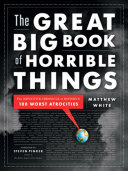
 Happy New Year …
Happy New Year …

 As the Year 2019 ends, many are concluding – and yes, we are among those concluding, we the movement behind the 2013 book Go Lean…Caribbean – that this “time did not fly”; it dragged along slowly; “Chronostasis” indeed during this “year of living dangerously”; (see Appendix Reference below).
As the Year 2019 ends, many are concluding – and yes, we are among those concluding, we the movement behind the 2013 book Go Lean…Caribbean – that this “time did not fly”; it dragged along slowly; “Chronostasis” indeed during this “year of living dangerously”; (see Appendix Reference below).







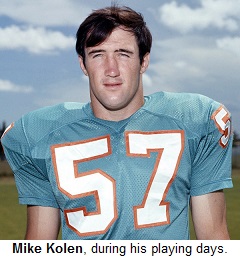





 In our founding documents, Billy Graham explains that Christianity Today will help evangelical Christians interpret the news in a manner that reflects their faith. The impeachment of Donald Trump is a significant event in the story of our republic. It requires comment.
In our founding documents, Billy Graham explains that Christianity Today will help evangelical Christians interpret the news in a manner that reflects their faith. The impeachment of Donald Trump is a significant event in the story of our republic. It requires comment. To the many evangelicals who continue to support Mr. Trump in spite of his blackened moral record, we might say this: Remember who you are and whom you serve. Consider how your justification of Mr. Trump influences your witness to your Lord and Savior. Consider what an unbelieving world will say if you continue to brush off Mr. Trump’s immoral words and behavior in the cause of political expediency. If we don’t reverse course now, will anyone take anything we say about justice and righteousness with any seriousness for decades to come? Can we say with a straight face that abortion is a great evil that cannot be tolerated and, with the same straight face, say that the bent and broken character of our nation’s leader doesn’t really matter in the end?
To the many evangelicals who continue to support Mr. Trump in spite of his blackened moral record, we might say this: Remember who you are and whom you serve. Consider how your justification of Mr. Trump influences your witness to your Lord and Savior. Consider what an unbelieving world will say if you continue to brush off Mr. Trump’s immoral words and behavior in the cause of political expediency. If we don’t reverse course now, will anyone take anything we say about justice and righteousness with any seriousness for decades to come? Can we say with a straight face that abortion is a great evil that cannot be tolerated and, with the same straight face, say that the bent and broken character of our nation’s leader doesn’t really matter in the end?
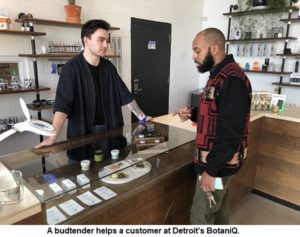 When Council adopted zoning ordinances for where there could be a provisioning center, the result was almost nowhere. Now much of the available space has been taken by medical marijuana provisioning centers. There are no social-equity provisions in the medical marijuana law, and any marijuana arrests from the past disqualified one from getting a provisioning center license. On top of that, the state is only taking adult-use marijuana applications from already established medical marijuana provisioning centers.
When Council adopted zoning ordinances for where there could be a provisioning center, the result was almost nowhere. Now much of the available space has been taken by medical marijuana provisioning centers. There are no social-equity provisions in the medical marijuana law, and any marijuana arrests from the past disqualified one from getting a provisioning center license. On top of that, the state is only taking adult-use marijuana applications from already established medical marijuana provisioning centers.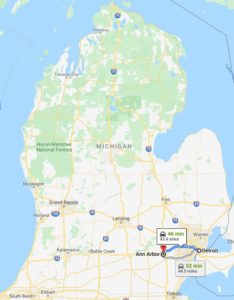
 Surely, these constitutional provisions allow the United States to be a more Perfect Union? Undeniably, No! In fact, these constitutional mandates have resulted in a more unequaled society. As we examine the actuality of America’s criminal justice system, we concur with the critics and scholars, that the legal deficiencies are acute; see these headlines here:
Surely, these constitutional provisions allow the United States to be a more Perfect Union? Undeniably, No! In fact, these constitutional mandates have resulted in a more unequaled society. As we examine the actuality of America’s criminal justice system, we concur with the critics and scholars, that the legal deficiencies are acute; see these headlines here:
 New Birth Missionary Baptist Church has raised $120,000 to provide bail for first-time, nonviolent offenders in four Georgia counties.
New Birth Missionary Baptist Church has raised $120,000 to provide bail for first-time, nonviolent offenders in four Georgia counties. So many times, governmental institutions – think security forces – abuse their position/strength and exploit the rights and property of ordinary citizens.
So many times, governmental institutions – think security forces – abuse their position/strength and exploit the rights and property of ordinary citizens. 
 We can allow for sanctions and retributions against security forces/justice institutions for procedural violations while still pursuing justice. This approach works in civil proceeding, international peace-keeping and political cases (think impeachment); so there could be some “Solomonic” approach in criminal proceedings – especially when no death penalty is attached. (Ancient Israel King Solomon threatened death to a child in order to ascertain the true identity of the real mother – this proved to be indisputable wisdom).
We can allow for sanctions and retributions against security forces/justice institutions for procedural violations while still pursuing justice. This approach works in civil proceeding, international peace-keeping and political cases (think impeachment); so there could be some “Solomonic” approach in criminal proceedings – especially when no death penalty is attached. (Ancient Israel King Solomon threatened death to a child in order to ascertain the true identity of the real mother – this proved to be indisputable wisdom).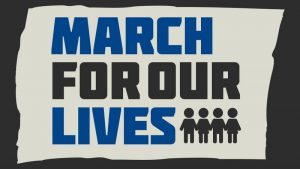
 The “Land of the Free and Home of the Brave” with its laissez-fare attitudes towards gun ownership and stockpiling of lethal weapons is not a positive attribute.
The “Land of the Free and Home of the Brave” with its laissez-fare attitudes towards gun ownership and stockpiling of lethal weapons is not a positive attribute.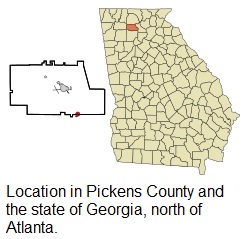

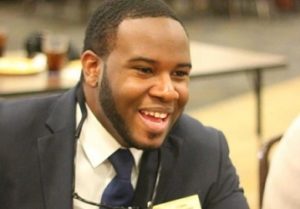

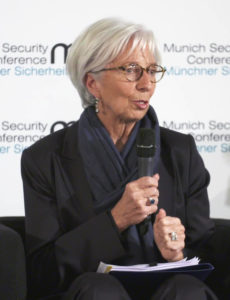 Title – What to expect from ECB’s new President Christine Lagarde?
Title – What to expect from ECB’s new President Christine Lagarde?
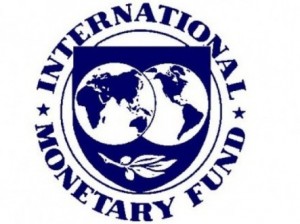 Christine Lagarde’s authority is not a vesting of political power; she has only been appointed to these roles, due to her core competence with monetary policies and controls, but yet she has exceeded the terms of all of those who appointed her.
Christine Lagarde’s authority is not a vesting of political power; she has only been appointed to these roles, due to her core competence with monetary policies and controls, but yet she has exceeded the terms of all of those who appointed her. … the lacerating verdict of the IMF’s top watchdog on the fund’s tangled political role in the eurozone debt crisis, the most damaging episode in the history of the Bretton Woods institutions.
… the lacerating verdict of the IMF’s top watchdog on the fund’s tangled political role in the eurozone debt crisis, the most damaging episode in the history of the Bretton Woods institutions.